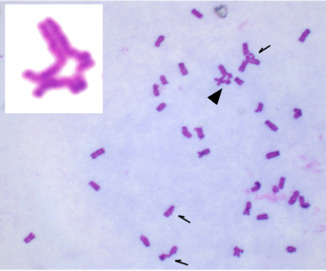Susceptible mouse leads CU geneticists to link between a gene mutation in DNA's copying process and breast cancer
By Krishna Ramanujan

By discovering a mutant mouse that is highly susceptible to mammary tumors, Cornell researchers have found a novel potential link between genetic defects in DNA replication (copying) and breast cancer.
The mouse contains a mutation in a gene essential for replicating DNA in both humans and mice that increases the rate of flawed copies of genetic material, leading to mouse breast cancers.
In a paper published in Nature Genetics online (and upcoming in the Dec. 27 print issue), the Cornell geneticists report that by extensively testing hundreds of mice pedigrees, they found a mutant line of mice called Chaos3 that had a 20-fold increase in a hallmark for cancer called genomic instability -- a blanket term for an elevation in the number of mutations, chromosomal aberrations or loss of integrity of genetic information that occur when DNA replicates. While the Chaos3 mice appear normal in every way, the females are highly predisposed to mammary tumors.
"It's known that most cancers, by the time you look at them, have genomic instability in some form or another," said John Schimenti, a genetics professor in Cornell's Departments of Biomedical Sciences, and Molecular Biology and Genetics and the paper's senior author. "Our research demonstrated that genomic instability is probably leading to these cancers."
Schimenti and colleagues found that in the Chaos3 mice, the DNA codings in a gene called Mcm4 were partially impaired. The Mcm4 gene is one of six related Mcm genes that play essential roles in replication and were originally discovered at Cornell in baker's yeast (S. cerevisiae). The genes have remained largely unchanged throughout evolution and are evident in archaebacteria, yeast, mammals and more. It is unknown why the impaired Mcm4 genes in the Chaos3 mice led exclusively to breast cancer, Schimenti said.
Mcm4 is essential for DNA replication and thus cell growth, according to Schimenti. Partially impaired Mcm4 genes, however, allow Chaos3 mice to live normal lives but greatly increase the rate of faulty DNA replications and genomic instability.
"It's insidious because there is no warning that one might have this cancer predisposing allele [DNA codings at a given site] because the mice live normally," said Schimenti, who is also director of the Center for Vertebrate Genomics.
The researchers plan to study further the other Mcm genes to see if they, too, play a role in cancers.
The Mcm genes were discovered by Cornell professor of molecular biology Bik Tye, while studies of the mouse tumors were done by Ana Alcaraz, a veterinarian in Cornell's Section of Anatomic Pathology in the Department of Biomedical Sciences.
The study was funded by the National Institutes of Health and a Department of Defense grant to lead author Naoko Shima, an assistant professor at the University of Minnesota's Department of Genetics, Cell Biology and Development.
Media Contact
Get Cornell news delivered right to your inbox.
Subscribe